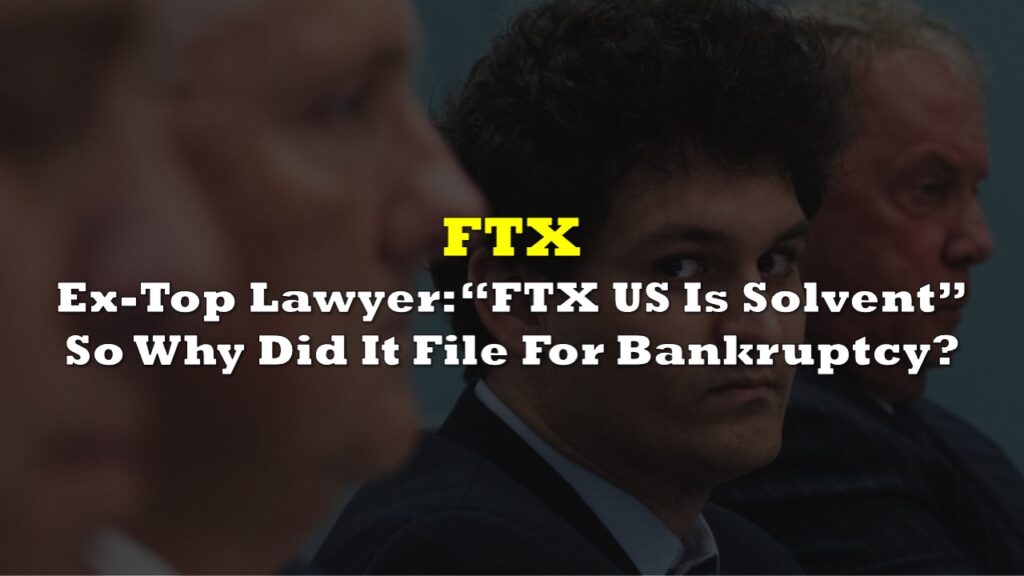The US Internal Revenue Service (IRS) has filed approximately $44 billion in claims against the estate of insolvent crypto exchange FTX and its connected organizations.
The IRS filed 45 claims against FTX firms, including West Realm Shires (the legal entity of FTX.US), Ledger Holdings (the parent company of LedgerX and LedgerPrime), Blockfolio, and Alameda Research among others, in bankruptcy papers dated April 27 and 28.
JUST IN: IRS has hit #FTX exchange with a $41,570,751,849.37 tax bill. pic.twitter.com/P1h2SmIl71
— WhaleWire (@WhaleWire) May 11, 2023
The highest claims are $20.4 billion and $7.9 billion against Alameda Research LLC, respectively, and $9.5 billion against Alameda Research Holdings Inc.
The claims are filed under the designation “Admin Priority,” which may allow the IRS’ claims to take precedence over other creditors’ claims in a bankruptcy case.
This is exactly the thing why US is the most hated country in the world. Millions of international customers are going to be robbed by US government and US legal system pic.twitter.com/XvlqVJCW7H
— MHE BE3ET (FTX Creditor) (@MHE_BE3ET) May 10, 2023
The IRS is collecting approximately $20 billion in partnership taxes, according to bankruptcy records detailing the $20.4 billion claim against Alameda Research LLC. The balance of the claim includes millions in withheld income and payroll taxes.
“Federal law prevents the IRS from confirming or denying any correspondence with regard to any taxpayer case,” said a spokesperson for the IRS.
FTX’s bankruptcy counsel said they found more than $5 billion in various assets during a hearing in January 2023, while the business estimated it had between $1 billion and $10 billion in assets overall in initial bankruptcy filings. These metrics have shifted as the company’s management has raised new capital in recent months.
But following the government’s claims on FTX, the creditors would have to wait further down the line as FTX lawyers and consultants made their own billings of over $145 million in just 5 months since the bankruptcy process started. This adds to the amount the bankrupt exchange need to come up with to satisfy obligations, then the creditors.
NEW: FTX lawyers and consultants have charged over $145 million in just 5 months – Court filing pic.twitter.com/fzDMHarEwy
— Radar🚨 (@RadarHits) May 2, 2023
FTX is facing pressure to recover as much liquid assets it can to satisfy the mounting bill. Last week, the bankrupt exchange attempted to recover about $4 billion from similarly insolvent crypto lender Genesis and a still-solvent British Virgin Islands-based firm.
Is their tax that big?
Observers are looking into the breakdown of the IRS’ claims, perusing the astronomical bill the tax agency is claiming against FTX. Twitter user @MeatTC_ wrote that “it appears the IRS went back and reclassified ALL employees from contractors to employees and hit them for unpaid employer-side employment taxes,” alleging that FTX might have availed itself of tax loopholes in the years of existence.
“Since Alameda Research LLC is likely a partnership for tax purposes, the back taxes are assessed at the partnership level but depending on what’s in the partnership agreement it may “push out” the assessed taxes to partners,” the tweet read.
Since Alameda Research LLC is likely a partnership for tax purposes, the back taxes are assessed at the partnership level but depending on what's in the partnership agreement it may "push out" the assessed taxes to partners.
— Meat (🥩,🥩) (@MeatTC_) May 10, 2023
Tax loopholes have been shot to mainstream discussion recently after US President Joe Biden shared an infographic on Twitter, calling to end “tax loopholes” that allegedly help wealthy crypto investors.
According to Biden, closing such loopholes would save approximately $18 billion. However, the president provided no information on whether loopholes existed or what improvements would result in the possible savings he mentioned.
Twitter also fact-checked Biden’s tweet, saying “there is no evidence of ‘Loopholes’ to avoid” paying tax on virtual currency.
We don’t have to guess what MAGA House Republicans value. They’re telling us. pic.twitter.com/BM6JGMEFeq
— President Biden (@POTUS) May 9, 2023
FatMan, a pseudonymous crypto researcher, responded by claiming that Biden’s “facts are off.” The crypto analyst pointed out that the crypto market will shrink by $1.4 trillion in 2022, while corporate profits in the United States will be $11.8 trillion.
“The crypto market is both much smaller & fell heavily. We both know where the loopholes really are,” FatMan tweeted.
Billy Markus, co-founder of Dogecoin, also responded to Biden’s tweet. Markus inquired about any loopholes and stated that he provided the government more money than he made in crypto, “while taking all the risk.” Markus goes on to say that most American crypto users are not wealthy and are trying to utilize crypto to make ends meet.
While some are unsure what crypto tax loopholes the president is referring to, Redditors speculated that it could be the IRS wash sale rule, which forbids selling stocks at a loss and reacquiring them within 30 days, which has not yet been applied to crypto.
MicroStrategy’s decision to sell Bitcoin in December 2022 is an illustration of this. MacroStrategy, a subsidiary of MicroStrategy, sold 704 BTC on December 21 at an average price of $16,776 per BTC. The corporation has stated its intention to lower its tax bill.
As a result, MicroStrategy reported its first profit in nine quarters after claiming a tax gain due to its bitcoin hoard.
Information for this briefing was found via Coin Telegraph, Coindesk, and the sources mentioned. The author has no securities or affiliations related to this organization. Not a recommendation to buy or sell. Always do additional research and consult a professional before purchasing a security. The author holds no licenses.









